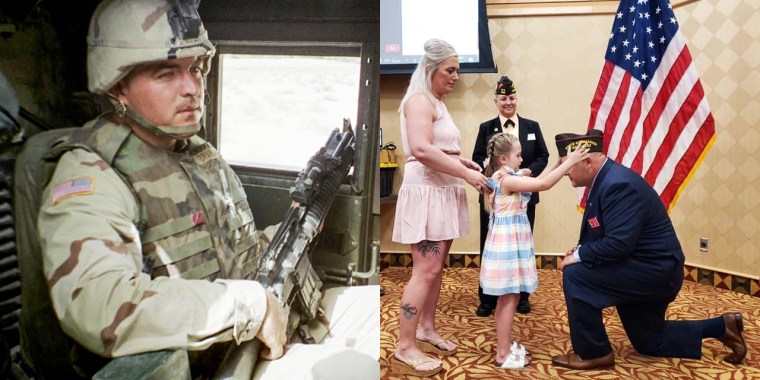A U.S. military veteran who would have benefited from two bipartisan measures recently sacked in the House and Senate said lawmakers “spit” in veterans’ faces by rejecting both proposals.
Michael Braman, 45, is one of many veterans left angry and confused after Senate Republicans suddenly tanked a widely supported measure that would have expanded medical coverage for millions of former military members exposed to toxic burn pits during their service.
Supporters of the Sergeant First Class Heath Robinson Honoring Our Promise to Address Comprehensive Toxics Act — or PACT Act — overwhelmingly expected the House-passed bill to sail through to the president’s desk for a signature.
But in a procedural vote Wednesday night, 41 Senate Republicans blocked the bill’s passage, including 25 who had supported it a month ago.
“They’re playing games with our veterans and their families, and that’s cruelty,” Braman said. “Our leaders of our country spit in our face by going back on this bill.”

The move comes two weeks after a House committee declined to advance the Maj. Richard Star amendment, which would make medically retired and severely disabled combat veterans with under 20 years of active service eligible for both disability and retirement benefits.
“I’m fuming over this,” said Braman, who is relying on the passage of both measures.
Braman said he was a star athlete in high school who never had breathing problems. But when he returned home from a deployment to Afghanistan, where he said he was constantly around open-air burn pits, he was diagnosed with asthma.
Burn pits were common at U.S. military bases during the wars in Iraq and Afghanistan. Dangerous materials, from electronics and vehicles to human waste, were regularly doused in jet fuel and set ablaze, spewing toxic fumes and carcinogens into the air.
"Depending on the wind, no matter where you were, you’d get the smoke," Braman said.
After serving in the Army and the Army National Guard for 19 years and five months, Braman said the military forced him to medically retire in 2014 due to disability caused mostly by post-traumatic stress disorder.
Under the Maj. Richard Star amendment, Braman and about 50,000 other combat-disabled veterans like him would qualify for hundreds, if not thousands, of dollars more a month in benefits.
When the House Rules Committee did not move that amendment forward two weeks ago, Braman said he felt forgotten by the nation he served.
At the time, however, he felt hopeful that at least the PACT Act would succeed, expanding Veterans Affairs health care eligibility to more than 3.5 million post-9/11 combat veterans who were exposed to toxins while serving in the military.
“If we didn’t get both of them, at least I thought we would get one. I was 100% sure we were going to get it. It was a done deal,” Braman said.
Up until Wednesday, the PACT Act had received overwhelming support in both legislative chambers. In June, the Senate passed the original legislation 84-14. It underwent minor changes when it moved to the House, where it passed 342-88.
When the bill returned to the Senate, the bill had not changed much, but the view — and vote — of 25 senators did.
Some of the legislators told NBC News on Friday that they refused to vote to end debate for the version of the bill that reached the Senate floor Wednesday because of what a spokesperson for Wisconsin Sen. Ron Johnson, a Republican, called a “budget gimmick that allows for $400 billion dollars in spending over the next 10 years unrelated to veterans.”
Some of their Democratic colleagues believe the move was political.
In remarks on the Senate floor about his colleagues' change of heart, Sen. Chris Murphy, D-Conn., said, "Republicans are mad that Democrats are on the verge of passing climate change legislation and have decided to take out their anger on vulnerable veterans."
Many veterans and their advocates agree.
"I’m so fed up with the politics when it comes to veteran issues," Braman said. "It is downright disgusting."
The Senate could vote again on the PACT Act as soon as Monday. In an exchange with reporters Thursday, Senate Majority Leader Chuck Schumer, D-N.Y., said, “We are going to give our Republican friends another opportunity to vote on this Monday night.”
Steven London, 37, another combat-disabled veteran who would benefit from both bills, is optimistic that the PACT Act will pass this year.
The Purple Heart recipient served nearly 10 years of active duty in the Army, including five years in Afghanistan, where he said burn pits were a "regular everyday part of life."
He was diagnosed with asthma in 2021.
London said he wanted to remain positive, "although it definitely feels like a setback."

